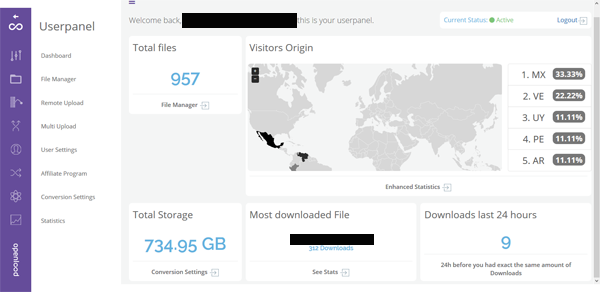Earlier this month we reported on the plight of Rapidvideo, a popular file-hosting site that specializes in hosting videos.
The site previously allowed visitors to view content uploaded by other users for free, with the system funded by advertising. However, interesting market conditions forced the platform into a surprise announcement.
“We can’t finance ourselves from internet ads any longer,” the company said while revealing plans for a $5 per month subscription plan.
One of the main problems, it transpired, was the massive influx of Kodi users, whose ‘pirate’ add-ons access the site’s content, bypassing its advertising.
“We have around 650 Gbit/s of bandwidth in use, while 320 Gbit/s is for KODI, download tools, etc and for that we don’t get paid by the ads,” the site explained.
In comments to TF, Rapidvideo said that the add-ons in question are able to use the URL from the site’s HTML5 player, resulting in huge amounts of unmonetized video traffic. The need for a subscription package would help to mitigate that issue, the site added.
Of course, Rapidvideo isn’t the only site to suffer from this and similar problems. This week, another file-sharing giant changed its business model, again citing unsustainable ad revenues as the cause.
Openload is currently one of the top 250 most-visited sites on the entire Internet. Last year we reported how it generates more traffic than Hulu or HBO Go. However, similar pressures to those being experienced by Rapidvideo have forced the platform towards change.
The big immediate difference is that users who upload content to the site will no longer get paid based on the number of views their videos get. That’s a bit like YouTube de-monetizing all of its most popular contributors.
“We are closing our Affiliate Program from 15/04/2019. Balances which exceed the minimum withdraw amount of 20$ can be withdrawn until 30/04/2019!” the site said in a statement to its many affiliates.
“Unfortunately we had to do this step due to recent events and ongoing weakness in generating revenue from advertising. In order to keep the service alive and stable we have to go this way.”
Only the operators of the site know how many of these uploading affiliates it has but there was certainly no shortage of criticism online when the program was withdrawn. That being said, all businesses are affected by changes in the market and if the revenue doesn’t pay the bills, then that’s life.
Affiliates aren’t paid a lot. The image above (redacted for privacy reasons) shows the Openload affiliate panel. The user had made less than $9 but of course, he won’t be getting any money because he didn’t accumulate at least $20. Others, however, report being paid out, as promised.
The other key issue is that affiliate programs incentivize users to upload content to a particular service, with YouTube operating the most famous program of all. It’s easy to see how the removal of the Openload program could result in less content being uploaded there. However, the operators of the site say they are fully aware of what might happen.
“All our decisions are final. We are aware of the consequences,” a representative said.
For now, it appears that a handful of other services are rallying round in an attempt to attract former Openload affiliates to their sites. Whether that will be successful will remain to be seen, but there certainly appears to be a connection between the size of these sites and their ability to earn revenue from ads.
The bigger they are the harder it is, apparently. Which means that successful sites might eventually start suffering from the same issues as both Rapidvideo and Openload.
Update: Official comment from Rapidvideo to TF:
“We just launched our premium sales program yesterday and a time limit of 60 minutes per day from one IP [address], then a 1-hour cooldown pause.
“We also launched the new version of our website with a search engine yesterday. This time limit of 60 minutes actually helps us a lot to prevent abuses such as Kodi users, unauthorized apps and tools to ‘leech’ from our servers.
“At this time, we have 165 Gbit/s now instead of the previous 630 Gbit/s. It results in huge money savings.“






